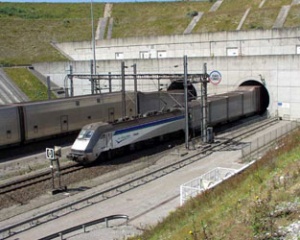Sharp slump in profits at Eurotunnel following fire

Profits at Eurotunnel – the venture which controls the Channel Tunnel – slumped dramatically in 2009, amid the continued “poor economic environment”.
The company – a joint venture between France and Great Britain – reported a net profit of €1.4 million (£1.3 million) for the financial year 2009; down from €34 million (£31 million) a year earlier.
Services at the tunnel were hit by a fire in September 2008, with schedules not returning to normal levels until February 2009.
Snow in December 2009 – which saw Eurostar services cancelled for five days – also took a toll on results.
Following difficulties evacuating passengers during the incident, a working group has been launched to assess whether the present 400 metre trains remain the strongest configuration for safe evacuation.
ADVERTISEMENT
Eurotunnel itself carries car and coach passengers, and freight lorries from Great Britain to western Europe.
“The results for the year 2009 are proof of Eurotunnel’s resilience in the face of difficulties,” said Eurotunnel chairman Jacques Gounon.
Deutsche Bahn
Deutsche Bahn has also mooted the possibility of running a new service from London St Pancras to Frankfurt.
To date, the German organisation has been excluded from access to the tunnel by Anglo-French regulators requiring trains be at least 375 meters (1,230 feet) long and divisible into separately functioning halves.
However, Eurostar’s failure to promptly evacuate 2,000 people from the tunnel on December 18th 2009 could now prompt regulation changes.
“The crisis clearly demonstrated that this makes no difference at all,” explained Mr Gounon.
“It’s going to take some time, but I’m convinced that this is the solution, and it has the advantage of facilitating new entrants.”
Railfreight
Eurotunnel also outlined plans to introduce high-speed freight trains to the Channel Tunnel; with the Carex project seeking to replace short-haul flights by express airfreight operators with trips by modified high-speed trains.
“We are working on a number of projects, including the Carex project, and we think that we can regenerate the railfreight business if we are able to have a service of high quality,” concluded Mr Gounon.

